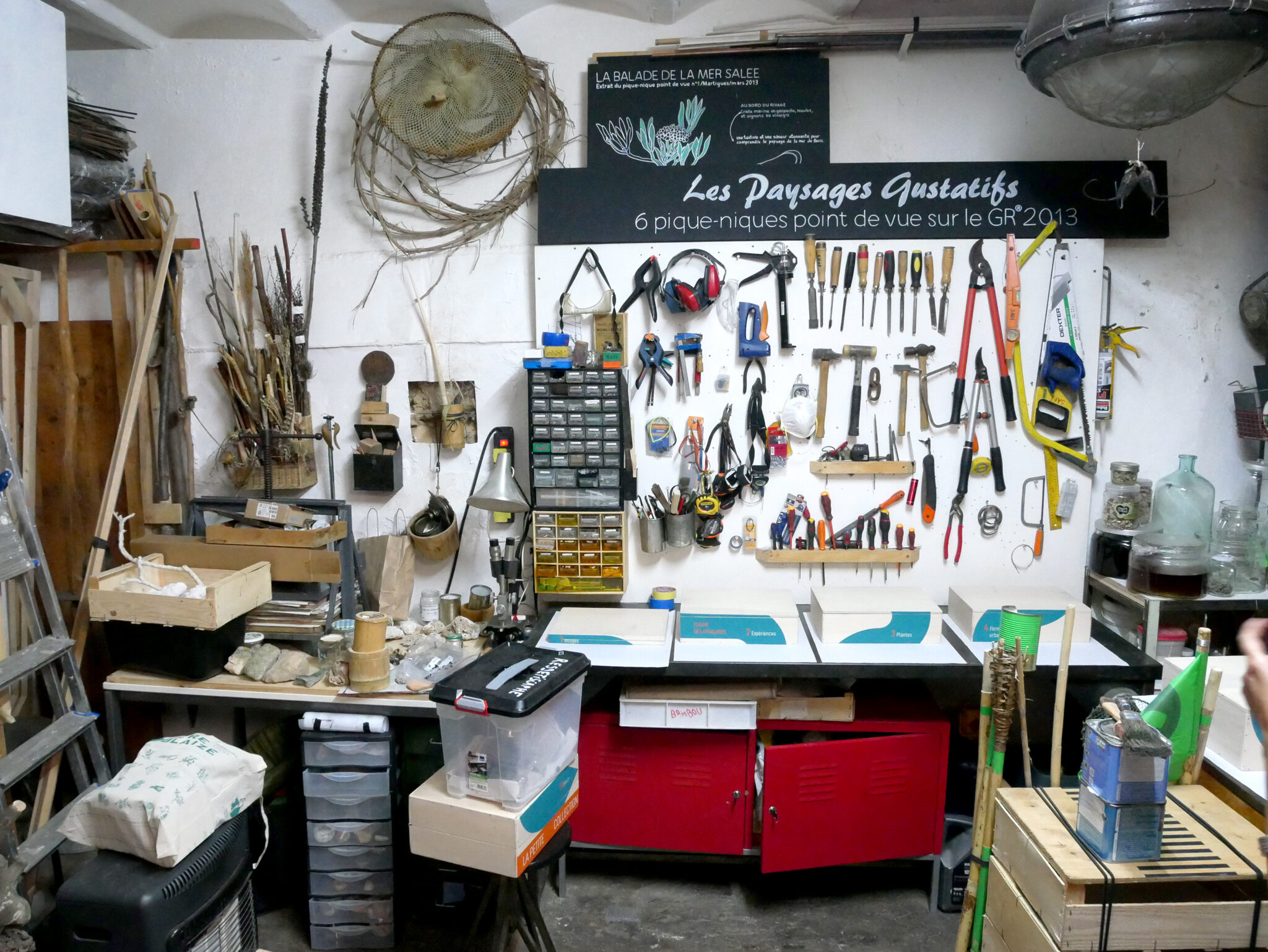Sculptor

“Before we had a flat, plus this space here. And now we only have here. [...] Because we were spending so much time here, and we realised we were spending money on rent for a space [the flat] that we barely used. Because it's complicated to think about a schedule: when is the moment you need to work, when is the right moment. So we ended up with a flat a little bit deserted... that we didn't manage to "occupy". Because everything we enjoyed doing was in our studio! [laughing]”
- Product / Work mode
- Informal rules
- Physical accessibility / Location
- Use
- Working hours
- Urban context
“I had met people from Marseille, and I was moaning about housing with them. Back then we spoke in Francs. And they told me for 2000 Francs [circa 300€] you have 80 square meters in Marseille. I found this so crazy that I didn't believe it one second. So they told me: "Come and see". And I realised it was true. [...] and you could live close to the sea, and the weather is so nice. So I was like, it's crazy this place! It's a paradise. [...] Very quickly I was like, okay, that's what I'm going to do. I'm going to move to Marseille [from Paris]. It was so nice, so exciting. I really felt like I was moving to a new country, the way people behaved was very refreshing. [...] Like people didn't line up on the right-hand side in the escalator! [laughing] [...] It was really paradise... and then, of course, I realised it was more complex than this.”
- Contract
- Other charges
- Rent
- Period
- Urban context
“[My partner] works with metal. I could work in my flat but they couldn't. So we were looking for a place to host both our practices. [My partner] needs to load heavy things, so it was necessarily a ground floor. And I need to work in a clean environment. So we really need to separate our practices. We were looking for something but it was really a rare bird. With two separate spaces, to do things that were very dirty, noisy and others calm and focused. And we found an ad in a a free newspaper: to rent, 140 square meters. And at the beginning the rent was 450€.”
- Contract
- Cost
- Rent
- Found conditions / Suitability
- Interior modification
- Ownership / Management
- Physical accessibility / Location
- Use
- Urban context
“Back then there were no artists. [...] This place was a garage that chromed parts for Harley-Davison motorbikes. [...] There was not that much activity on the street, we were very alone. [What brought us here] is this space, very cheap, on a ground floor, that had all the elements we were looking for: a big door that opens fully to load, a place long enough to unload, store and work with metal poles 3-meter long, being able to park to unload... So we had lots of demands, and here it brought everything together. So it was a rather exceptional workspace. ”
- Cleanliness
- Damages
- Light
- Noise
- Found conditions / Suitability
- Interior modification
- Physical accessibility / Location
- Urban context
“Our landlord, we've never met them. In twenty years, never met them. Everything goes through an estate agent. [...] They didn't ask much paperwork, and that was good for us because we didn't have much to offer in terms of guarantee back then. ”
- Contract
- Other charges
- Informal rules
- Planning laws / Policies
“Here it's a "bail de gré à gré" [a negotiated lease between two parties], because garages don't have specific leases to work with. [...] The lease says: everything is on us, that the landlord will never do any work. But we felt the rent was really cheap, and that we are in an exchange, in a bartering relationship. The place was in a terrible state, there was no water with only one WC. There was no hot water, there's no electric plugs anywhere, the walls are in terrible condition. The guy before did chrome so that's super toxic. The floor is filthy with grease and motor oil. So we invested in this space so that it's nice for us, pleasant. So we did a lot: redo the walls, do a floorboard, add a sliding separation, bring in some light by opening up. So that's work we do as tenants, we know we're never going to see that money again. And for us that's the deal, we're going to make of this space a better space. But we're investing in cheap materials, with the means we have.”
- Cleanliness
- Damages
- Light
- Finance
- Contract
- Cost
- Other charges
- Rent
- Designated regulations
- Planning laws / Policies
- Adaptation
- Found conditions / Suitability
- Interior modification
- Materials
- Ownership / Management
- Use
“When we arrived in Marseille, the paradise aspect was also strong because it matched something my partner and I were seeking, an immersion in something that is more "wild" [sauvage], but that's a weird word "wild". But a space where nature was more present. In Paris it's something that we missed a lot, that we fantasied a lot and we went and sought out. We really got inspiration from nature without being in contact with it. In our practice we often referred to nature. [...] When we arrived in Marseille we realised there was a presence of natural elements in the city: viewpoints, there are many streets where you can see the hills surrounding the city, the sun is very present that makes a light that's very strong. [...] So when we arrived we realised quickly that, our practice took place indoor, but also outdoor. ”
- Product / Work mode
- Urban context
“[As our practice evolved], our relationship to this space changed a bit. We realised we didn't need as much to build things all the time. But at the beginning because we made things a lot, we're fine artists [artistes plasticiens]; my partner comes from design and I did upholstery. So we are objects makers. So we did some installation, we've built some space and invited the audience to come in. [...] So we built these installations and installed them in public spaces to work at the edge, audience would go through this space and experience a change. ”
- Product / Work mode
- Public relation & communication
- Use
- Urban context
“My planters [outside the studio in the street] is a way [to talk with people]. People stop, they give me seeds, they leave notes, gifts. [...] That didn't exist when I got here. Since they've started cleaning the street with hot water [...] it's not great for getting rid of pee and poo but it kills all the plants. Ten years ago, streets were certainly more dirty but also more vegetal. In the end, plants started to disappear progressively because of this focus on cleaning. [...] Fifteen years ago, this street and the ones adjacent, there were lots of plants: in the pipes, in the cracks, between the buildings and the street, it was much more green than today. People will tell otherwise, but today there are more planters but less spontaneous plants. [...] less biodiversity, less interactions with insects than what you had before that, when plants grew on their own. ”
- Urban context
